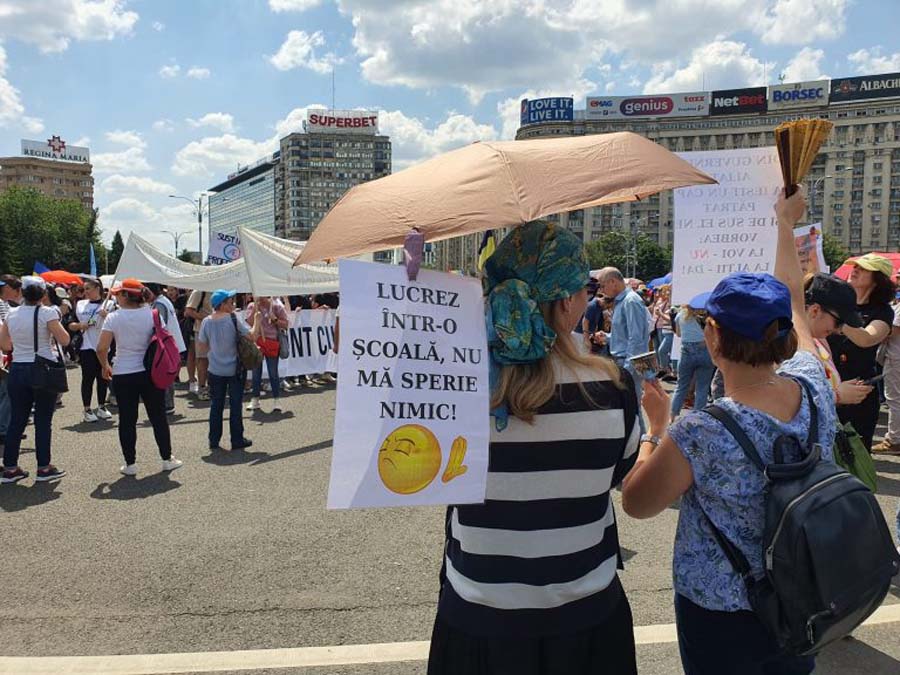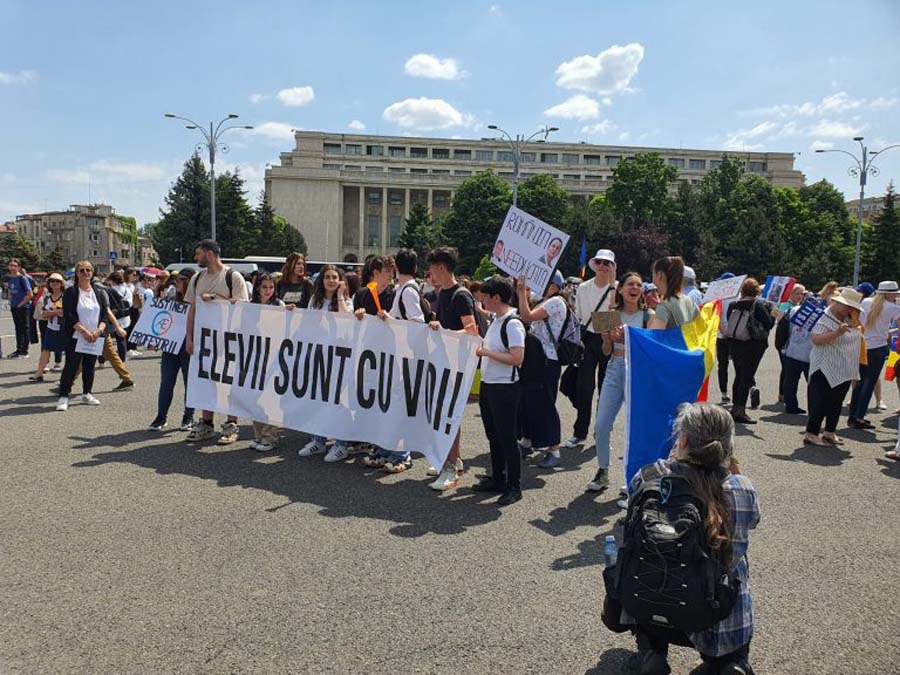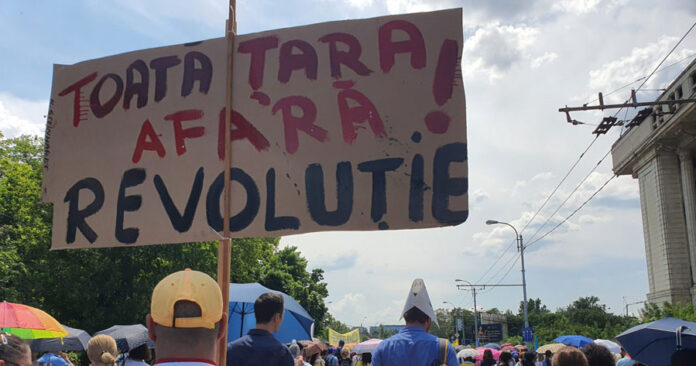Statement by the Internationalist Standpoint affiliate in Romania, GAS
After 3 weeks of strike, in the run-up to the national exams, the Government has published an Emergency Ordinance (OUG) granting an average salary increase of more than 25% for pre-university education staff, with the percentage varying according to grade, seniority and education. The first tranche of the increase is to be given from January 1, 2024. The starting salary has also been brought up to the level of the gross national salary. These are significant achievements that would not have taken place without the 3-week strike. As far as we know, during the recent strikes in a number of European countries by various sectors of workers, no one achieved an increase of salaries close to 25%. Having said that, we have to point out that the support and participation in the strike was so massive that a much better deal could have been achieved– an agreement that would significantly improve the living standards of education staff and improve the education system as a whole.
The education strike was suspended on June 12 by the national leaders of the main education unions (FSE and FSLI), following consultation with local leaders only and without the consent of the majority of striking teachers. Union bureaucrats declined to give the exact percentage of teachers supporting the continuation of the strike, but unofficial documents show that it varies between counties, with percentages mainly between 70-80%. A sense of hopelessness and disappointment developed as a result among striking teachers, and the union leadership was accused of betrayal. There have been calls to abandon the union or create alternative unions, as well as calls to merge the existing unions into one big organization after the current leaders are removed.
Suceava continues
The most combative stance was taken by striking teachers in Suceava county. The Suceava Education Trade Union Alliance (ASÎ) issued a statement stating that employees in the county will remain on strike, at their request, although the strike has been suspended on a national level. On Monday, June 12, 1,500 teachers protested in the streets of Suceava, saying that they have been betrayed by national leaders.
Δημοσιεύτηκε από Alianța Sindicatelor din Învățământ Suceava στις Δευτέρα, 12 Ιουνίου 2023
We are convinced that the teachers’ strike was a historic mobilization which will have long-term effects on class consciousness and class struggle. The struggle is still ongoing. It is unclear whether teachers will simply abandon the strike or reorganize. There have also been public calls to picket the FSLI and FSE union offices.

Some comments
While we continue to monitor the situation and try, where possible, to intervene with proposals, we have the following observations to make:
- Education workers have become convinced that the power is in their hands when they stop their work; that the employer ( in this case the government) is obliged to compromise when strikers do not back down. The government has seen its first two proposals rejected, namely the “professional development” vouchers and the 1,000 RON increase, and has been forced to come up with a new offer. This may serve as an example both within the education branch and for workers in other fields. We are certainly witnessing developments that generate progress in class consciousness. Based on the result of the teachers strike, and pushed by high inflation, especially in food, it is probable that in the coming period other sectors of workers (especially in the wider public sector) will decide to go on indefinite strikes and adopt a more combative attitude.
- The teachers’ strike has built visible solidarity among workers – this was also visible in the CFR (Romanian state railway company) workers’ protest -which was attended by trade unionists from the medical and forestry sectors- with support for the teachers’ strike being declared. And at a similar health workers’ protest, solidarity was called for between teachers, doctors, railway workers and forest workers. This solidarity needs to be translated in the future into cross-sectoral strikes and joint sets of demands. For this to take place, Unions that plan to go on strike in the coming period should coordinate beforehand and draw a common plan of strike action. At a certain stage this could develop in a public sector strike.Militant trade unionists should come together and coordinate their activity and proposals in advance. Also worth noting is the solidarity between students and teachers, the lack of which was previously lamented by teachers: many students have joined the protests and students’ associations in various counties have declared their support for the strike. At the same time, other structures have distanced themselves or even played into the government’s hands: for example, the National Council of Students and the National Federation of Parents (Edupart), led by an “entrepreneur”. The character of these organizations has become obvious – they exist to serve the class interests of the bourgeoisie and privileged social strata.
- As in most similar historical situations, it turned out that rank-and-file union members are more combative than their leaders. It was the masses of education workers, and not union leaders, who were outraged at every rejected government proposal. The leaders just had to reject them as long as they took into account the position of the rank-and-file. The rebellion against the suspension of the strike still belongs mainly to the masses of employees, not the local leaders. The proposal for a 25% pay rise belonged to the FSE and FSLI leaders; a significant section of the teachers, on the other hand, considered it modest or insufficient from the outset and dared to hope for more significant pay rises[1]. It is also unclear whether union members in the counties were consulted before this proposal was put forward, along with the proposal on the pay of entry-level staff – the two proposals replacing the original list of demands. Other unions leaders betrayed earlier and more openly: Anton Hadăr, head of Alma Mater (one of the organizers of the strike), said on TV that the proposal to increase salaries by 1,000 RON (rejected by the strikers) belonged to “the unions”.
- The union leaders played the same (historically confirmed) role of traitors to the working class. Like in Poland 2019, the betrayal came in the form of “suspending” the strike. Historically, the trade union bureaucracies have an interest in reconciling labor and capital; in appeasing class struggle, not advancing it. Workers in any industry need to prepare for their betrayal at critical moments and be ready to go further – taking all the important decisions through democratic general assemblies and not letting the leadership decide on its own, building councils on the grass roots, being militant in their own organizations and changing leaders when they compromise to their detriment. It remains to be seen whether the teachers will succeed in removing Marius Nistor and Simion Hăncescu, the perpetrators of the betrayal, as well as the local leaders who took part in the decision[2] – who, according to our sources, have started to resign in some counties. But just a change of leadership and picketing of headquarters is not enough; it is necessary for disappointed strikers to get actively involved in the unions, to democratize them and prepare them for struggle, not compromise. We are also facing another danger: that of a withdrawal from the unions of the most militant layers of teachers as a result of disappointment – a gesture that some in the rank-and-file have called for. While outrage is understandable, this would be a strategic error. Without a union, employees are far more vulnerable and have far less bargaining power, and a new union covering only a small percent of the workforce is unlikely to make much difference. The solution is not to leave the union – but to get more involved in it.
- In the midst of important strikes and upheavals, the drawbacks of not having a workers` party that unites the most militant workers and activists, which is able to offer proposals, support and political guidance, are becoming very clear. Several calls to unite all the unions into one have been made, and teachers have also found that no political force represents their interests. This shows a development of class consciousness which offers a possibility for intervention and radicalization – but in the absence of a workers’ party with a clear line and a revolutionary program, with a presence also within the unions, it is significantly more difficult for a protest or strike to take a revolutionary direction, even when the contradictions of the system become obvious to the masses.

Significant step forward
The teachers’ strike undoubtedly represents a significant leap forward in class consciousness in Romania, which will inspire more combative action by organized workers in all areas in the long term. The government’s capitulation, while bitter for the most combative layer of teachers betrayed by their own leaders, demonstrates where the power really lies. Teachers need to organize around the more combative local unions, build grassroots committees and remove the leadership that has acted against their will. We hope for a continuation of the struggle in this direction. The situation in Suceava, where the strike has continued, represents hope for education workers across the country.
Notes:
[1] It was on this basis of teacher dissatisfaction with the proposed 25% increase, that GAS endorsed the position expressed by many in the field and supported the doubling of salaries across the education sector.
[2] A petition calling for the resignation of union leaders Marius Nistor and Simion Hăncescu, launched by a teacher, collected almost three thousand signatures in a single day.



